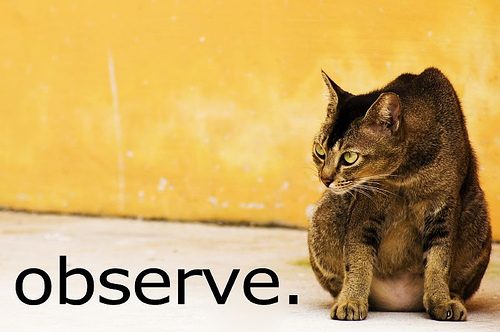 I know it’s been a while since we’ve chatted about measurement on #measurePR, and for that, I’m truly sorry.
I know it’s been a while since we’ve chatted about measurement on #measurePR, and for that, I’m truly sorry.
But the last scheduled chat was on a day when a lot of folk were heading back from this year’s SxSW conference (or festival, or whatever you want to call it) and it didn’t seem to make sense to hold it when many of them couldn’t participate.
However, prior to that we had a great chat with Steve King of Emergent Research, and I wanted to give you the much-delayed recap from that chat.
There’s a reason I asked Steve to be a guest on the chat… other than the fact that he totally rocks.
And that is because far too many public relations practitioners still don’t understand the importance of research.
Image: Mike Kline via Flickr, CC 2.0
By now, you’d think they would.
After all, research is what “strategic communications” are supposed to be based on, right?
Right. But there are still a lot of folk who don’t do it.
I’m not here to beat up on anyone; I know that budget, etc., often dictates what one can or can’t do.
But I thought it an important message to reinforce, and was thrilled when Steve agreed to share this thoughts with us.
Here’s a quick recap of what we discussed.
1. On the different types of research: primary, secondary, etc.:
Steve said, “Primary research is the collection of data that does not already exist. Surveys [are] the best-known example.
“Secondary research is the use, summary, or synthesis of existing research, e.g. using an existing survey or an article.”
So far so good, right? And I know that’s an elementary question, but there are always folks who are new to the field, so I wanted to start off with something very basic.
Steve also pointed out that another way to look at this is to undertake qualitative v. quantitative research, adding that the Internet has made everything much cheaper and easier to do.
And I really liked the way Steve described the everyday task of information discovery: “scanning to learn what we don’t know we don’t know.”
2. At what point PR pros should embark on research:
Steve said, “We think secondary research should be ongoing. We scan on topics of interest on a daily basis.”
I never really thought of my Google Reader, etc., as secondary research (for myself, I mean, I do advise clients to use it), but goshdarnit, it is!
It’s just not formalized as such, so that was a bit of an a-ha moment for me.
He also noted that primary research should be done as needed.
“We do primary research prior to making major decisions,” said Steve – a great rule of thumb for organizations to follow.
Another great tip from Steve: use primary research when secondary isn’t enough.
3. On how to decide which research method to use:
Steve said that they use a mix of tools on almost every project, with surveys, focus groups and interviews being the most common.
They use surveys to:
- Find out facts and things that can be quantified
- How much? How long? What color? etc.
- Understand large populations
- When statistical significance is needed
They use interviews and focus groups (they call them workshops) to extract softer information – feelings, attitudes, and so on.
 Matt LaCasse and Suzie Linville both pointed out that the method of research depends on what kind of information you’re trying to learn.
Matt LaCasse and Suzie Linville both pointed out that the method of research depends on what kind of information you’re trying to learn.
And finally, Steve said, “We use observational research (fancy name = ethnographic) for things we think people won’t talk about or answer in a survey.”
He said this is expensive and time-consuming, but leads to great information and is also fun.
See? Research is fun!
Image: TimberWolf_qx via Flickr, CC 2.0
4. Low-cost research tools:
We already know this, and Steve reiterated, that there are literally hundreds of them, e.g. Survey Monkey and Zoomerang, which are probably two of the most popular online survey tools.
However, a problem with online research, as Steve pointed out, is “the lack of statistical significance. This is due to biased or too small samples,” he said.
Some other ideas from Steve:
- Conduct online focus groups using GoToMeeting (Steve said this has worked surprisingly well for them)
- Try out Slideshare’s recent addition, Zipcast, for online focus groups (it’s free)
- Use conference calls for focus groups; it can be fairly inexpensive
Janet Rae-Dupree mentioned Gutcheck, which is fairly new, and which really does look interesting as an online D-I-Y research tool.
(I haven’t tried this yet, but it looks pretty cool as well as reasonable from a price point of view.)
And, Steve added, with social media, you can find people to attend these focus groups very easily, since they self-select.
5. Tools to use for sentiment analysis and social media monitoring:
Steve said they use a lot of the free tools (Google, Twitter Search, etc.), and low-cost tools like Actionly.
Kellye Crane asked a very interesting follow-up question: how to compile the information in a meaningful way when you use free tools.
Steve’s response: load key statistics from multiple sources into a spreadsheet and then score it.
(No one said it was easy or quick.)
6. And finally, can you use Twitter as a focus group?
Steve said, “Yes,” but within limits, because there’s a limit to how much you can follow up, or the level of depth of a Q&A.
He said it could be great for primary research data gathering, and that some of their best use of Twitter in this context was by using it to prep for in-person focus groups.
Not surprisingly, we ran out of time pretty quickly,
but the good news is that Steve will be coming back to #measurePR on April 26, so do save the date if you’d like to hear from him directly.
In the meantime, here’s the transcript of #measurePR with Steve King for you to peruse at your leisure.
And don’t forget that we’ll be holding the chat at the regular time next week, 12-1 pm ET. Seth Duncan will be returning for his encore performance, so don’t miss it.
And if you have a question for Seth, do please leave it in the comments below, or just shoot me a note. I’ll definitely pass it along.



![[EVENT]: PR Hacks for Small Biz (online)](https://shonaliburke.com/wp-content/uploads/2021/06/FB-Ad-1200x800-01-01-01-Copy-500x383.jpeg)





Great data, important and magnificent outline, as portion
exceptional stuff with exceptional plans and thoughts, heaps of incredible data
and impulse, both of which I require, because of offer such an accommodating
data here
I’d love to know what commammo thinks as well…
@3HatsComm Isn’t that a great saying? smallbizlabs is so smart.
I think good questions are really the key as well; if you ask the wrong questions, you may get great answers but that will be completely useless. That’s one of the reasons I jump at any chance to play with survey instruments – I learn so much simply in the process of designing a survey. I also really really really love surveys!
Too often forgotten. Love the learn “what we don’t know we don’t know” to which I must add: what you don’t know that you do know, what think you know but have wrong, what you should know but didn’t know to ask.. so many things. It’s the questions that drive strategy, create measurable objectives that focus tactics, pinpoint where you want and need to go, help you identify how.
Thanks for the low cost suggestions, too. I’m all for spending wisely, hate waste a la spending big $$ on a feasibility study when just a little more would actually DO it. Businesses need to research but not at the expense of doing. FWIW.